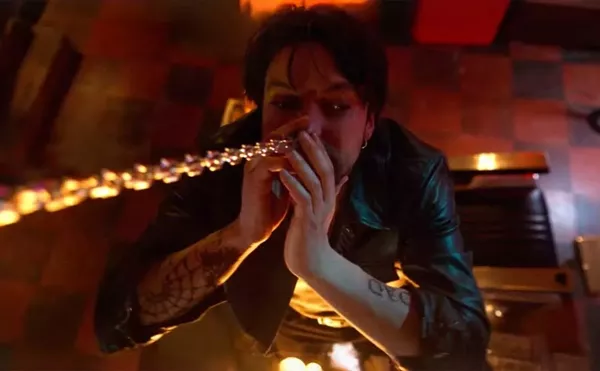
Audio By Carbonatix
[
{
"name": "GPT - Leaderboard - Inline - Content",
"component": "35519556",
"insertPoint": "5th",
"startingPoint": "3",
"requiredCountToDisplay": "3",
"maxInsertions": 100,
"adList": [
{
"adPreset": "LeaderboardInline"
}
]
}
]
Stop me if you’ve heard this one before: A mad scientist’s daughter is horribly disfigured in a car accident, so the scientist decides he’s going to find her a new face — partly because he feels responsible for the accident, partly because he’s a megalomaniac who thinks he can do anything, but mostly because he’s a mad scientist. In order to accomplish this, his faithful assistant kidnaps young girls for him to operate on. He carefully removes skin from the girls’ faces and grafts it onto his unfortunate daughter. I don’t want to give away too much of the plot but suffice it to say that this sort of behavior rarely leads to a happy ending.
The French horror film Eyes Without A Face (1959) used to show up, itself horribly disfigured — edited, badly dubbed and squeezed between commercials — on local TV back in the ’60s and ’70s under the wonderful pulp title The Horror Chamber of Dr. Faustus. Even in its battered form one could tell that this was a cut above your usual slice of Euro-horror. Though it has the kind of longueurs one associates with a genre piece, particularly those parts dealing with the clueless inspector rambling toward some sort of resolution, it also has moments of eerie beauty.
Which is not too surprising considering that this is a horror flick with a pedigree. Its director, Georges Franju, was an accomplished documentary filmmaker whose debut feature was a moody psychological study called Head Against The Wall (1958). The film’s crazed surgeon is played by Pierre Brasseur, whose many roles include a memorable turn in Marcel Carne’s classic, Children of Paradise. Alida Valli, of The Third Man fame, plays the classic “Igor” character who procures the innocent victims, and the director of photography is the legendary Eugen Schufftan. The circus-music-gone-terribly-wrong score is by Maurice Jarre (Lawrence of Arabia, Dr. Zhivago) and two of the five (!) writers credited with the screenplay also wrote the book that was the basis for Hitchcock’s Vertigo.
Hanging over it all is the inspirational spirit of Jean Cocteau, that most lyrical of surrealists. When the doctor’s daughter, imprisoned in a doleful mask, wanders through her darkened house or the private kennel of equally imprisoned dogs that her father uses in his experiments, the film achieves a kind of graceful morbidity. Even the movie’s grisly set piece, a painfully prolonged bit of surgical nastiness, has a suggestive unreality about it that renders it more poetic than gross (though the squeamish may disagree). Eyes has its clunky sections which seriously undermine its otherwise creepy tone, but it also has a lot of strange appeal, offering enticingly bizarre images that will stay with you long after its absurd plot has been forgotten.
In French, with English subtitles. Showing exclusively at the Detroit Film Theatre (inside the DIA, 5200 Woodward Ave., Detroit), Mon., Jan. 26. Call 313-833-3237.
Richard C. Walls writes about film for Metro Times. E-mail letters@metrotimes.com.





